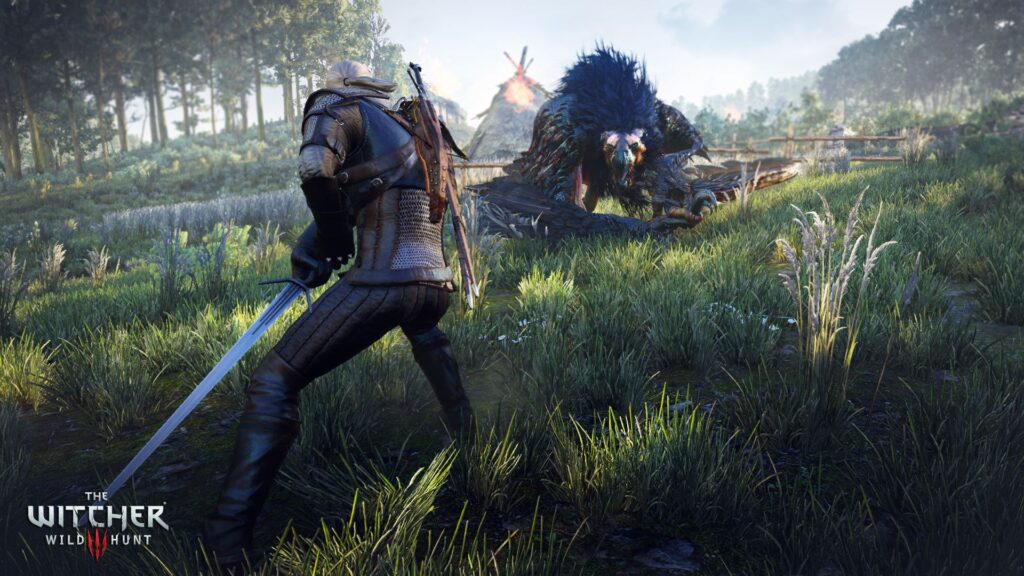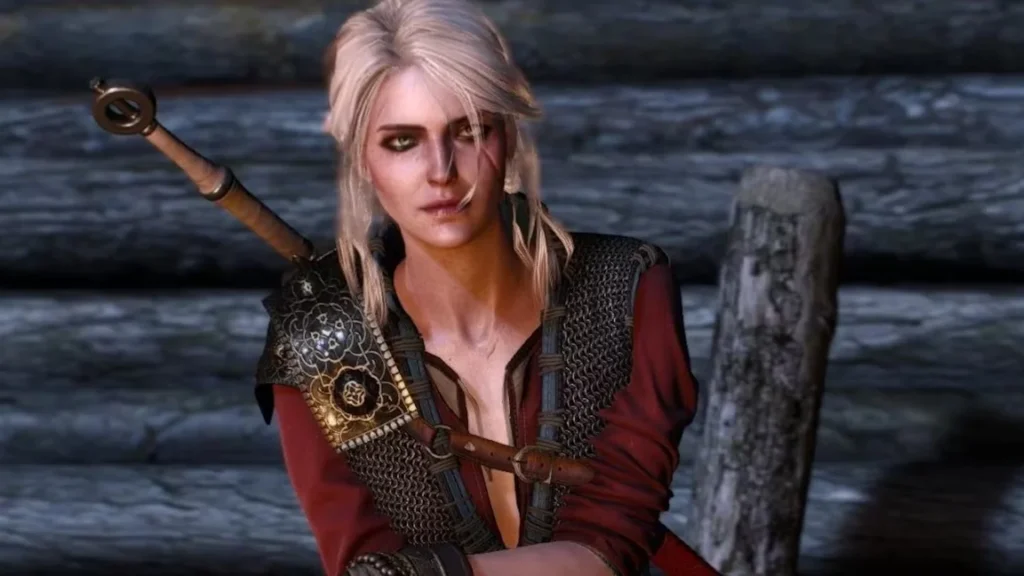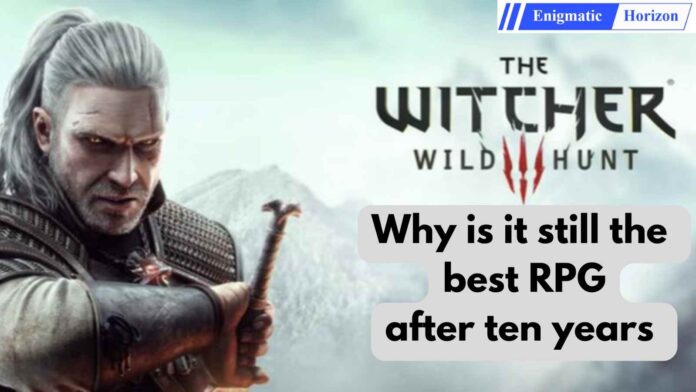In May 2025, Witcher 3 is officially going to complete ten years of release. And despite being ten years, there has been no other RPG that has been able to even come close in terms of story, characters and immersion.
It’s 2025, and many fan still can’t uninstall The Witcher 3. You have probably slain drowners more times than you’ve opened your fridge, and yet—every time you hear that melancholic soundtrack or ride through Velen at dusk—you get hooked all over again. This isn’t just a game. It’s a living, breathing saga that refuses to grow old, even when we all do.
Back in 2015, The Witcher 3 didn’t just drop—it descended like a meteor, reshaping open-world RPGs forever. It gave us a gruff, silver-haired monster slayer with more emotional depth than most Oscar winners, and side quests that made main missions in other games feel like chores.
And here we are, a decade later, still debating our choices in “The Bloody Baron” quest like it’s a life event. While newer RPGs chase trends, Witcher 3 remains what it always was—a masterclass in storytelling, world-building, and unapologetic brilliance. Let us take a look at why Witcher 3 is not just worth playing in 2025, but why it remains one of the best RPGs ever made.

Witcher 3 Storyline Summary – A Journey Full of Mystery, Monsters, and Meaning
If you’re new to the Witcher universe, let this Witcher 3 storyline summary be your first real taste of what makes it unforgettable. You play as Geralt of Rivia—a gruff, battle-scarred monster hunter with a soft spot for baths and lost daughters. But this isn’t just about killing beasts; it’s about finding Ciri, his adopted daughter, one of the few people who matters most to him.
Ciri isn’t just a runaway. She’s a Child of the Elder Blood, tied to a cosmic prophecy, and relentlessly hunted by the spectral Wild Hunt. What makes the Witcher 3 storyline summary so gripping is that it wraps you in mystery right from the start. Even if you’re unfamiliar with previous games or books, you’re pulled in by the emotional gravity. Will Geralt find her? Will they even recognize each other? And what happens if he does—especially when ancient forces are ready to pounce the moment she’s found?
What makes the story special is many of the side characters, whether we talk about the lovable characters like Zoltan, who is always there to fight beside Geralt, or tragic characters like Detlaff, from the Blood and Wine, DLC, who becomes a monster despite being altruistic.
That’s what makes Witcher 3 shine brighter than most modern RPGs. It’s not just a game. It’s a narrative puzzle layered with love, danger, and choices that haunt you long after the credits roll.
Why the Witcher 3 Story Feels So Immersive, Even After a Decade
Let’s talk about the Witcher 3 story—because if you’ve played it, you know it doesn’t just unfold on screen. It lives around you. It breathes through the forests of Velen, whispers through the streets of Novigrad, and crashes like thunder over Skellige’s stormy cliffs.
What makes the Witcher 3 story so immersive starts with its roots. Unlike many modern RPGs that build their world first and slap a story on later, Witcher 3 had the entire foundation laid out in Andrzej Sapkowski’s novels. That means its characters weren’t random archetypes—they were fully fleshed-out, flawed, and fascinating long before they were rendered in glorious 3D. The lore wasn’t “added later”—it was already rich with political tension, mythology, and emotional depth.
Second, the Witcher 3 story gives you freedom. You’re not chained to a main quest. Want to chase down a monster contract? Go ahead. Spend hours playing Gwent like it’s your actual job? Sure. Flirt, romance, or just chill in a bordello? Totally valid life choices. Some missions in Witcher 3 can be so scary and creepy that they can even rival some horror titles. And if you do stick to the main quest, the emotional weight of finding Ciri drives the first 60-70% of the game—and it never feels forced.
And finally… the music. Oh man, the music. Every note in Witcher 3 feels handcrafted to match your journey. From battle chants to sorrowful lullabies, it makes you feel like you’re part of a legend still being written.
Why Even Many Immersive Games Like Witcher 3 Struggle to Measure Up

Over the years, we’ve seen a flood of open-world titles promising deep stories, freedom of choice, and rich world-building. And sure, many of them are great. But even the most immersive games like Witcher 3 often struggle to capture the same magic. Why?
One reason might be that The Witcher 3 doesn’t treat immersion like a checklist. It’s not just about “big map + branching dialogue = immersion.” Instead, it feels alive. The world reacts to you. Characters remember what you’ve done. Choices have lasting consequences that hit you when you least expect it.
Another issue? Pacing. A lot of modern games either rush the plot or bloat it with filler. In immersive games like Witcher 3, balance is everything—and Witcher 3 nails that sweet spot between intense main quests and meaningful side content that actually adds to the world, not just XP.
And then there’s writing. Let’s be honest: not every game has the luxury of being based on an acclaimed book series. Witcher 3 had years of lore and complex characters built in—and the developers respected that. You can feel it in every line of dialogue, every side quest that suddenly becomes more emotional than the main story in other games.
Immersion isn’t about size. It’s about soul. And that’s where Witcher 3 still holds the crown.
Witcher 4 and the Worry of a “Woke” Future – Can It Stay True to Its Roots?
With Witcher 4 officially on the horizon, longtime fans of the franchise can be seen excited —and a fair bit of anxiety. After the masterpiece that was Witcher 3, expectations are naturally sky-high. But after the trailer was met with mixed reviews, there’s a growing concern within the community that Witcher 4 might abandon the gritty, grounded tone of its predecessor in favor of a more politically “safe” or “woke” direction. Many fans were outraged by the appearance of Ciri as well. However, CD Projekt Red Responds to Witcher 4 Ciri Concerns.
It’s not that players are against inclusivity or progress. What worries most of them is the idea of forced messaging—characters or themes that feel like checkbox additions rather than natural parts of the story. Witcher 3 resonated because its world felt raw, morally grey, and brutally honest. It didn’t pander. It trusted the players to handle mature themes without preaching.
The fear is that if Witcher 4 prioritizes social agendas over storytelling, it could lose the very essence that made the series iconic. This is why there are certain things that Witcher 4 must definitely avoid.
Let’s hope that’s not the case. Let’s hope CD Projekt Red remembers why Geralt’s journey mattered to so many people across the globe: because it was human, messy, heartfelt—and real. If they can carry that spirit forward, we might just be looking at another classic.

FAQs – Quick Answers for Curious Witchers
Is The Witcher 4 coming out?
Yes! CD Projekt Red has officially confirmed that The Witcher 4 is in development, and to make things even more exciting—they’ve already dropped a teaser trailer. It doesn’t show much, but it’s enough to send longtime fans spiraling back into speculation mode. The next saga in the Witcher universe is real, and it’s coming.
When is Witcher 4 release date?
That part’s still a mystery. As of now, there’s no official release date for Witcher. Although earlier we felt that it might release by the end of 2025, now it seems that is likely not going to happen. Whispers suggest a window between 2026 and 2027. CD Projekt Red seems determined to take its time—and after Cyberpunk 2077’s rocky launch, that’s probably a good thing. So yes, it’s coming… just not soon. Be patient, witchers-in-training!
Is Witcher 3 free on PC?
No, Witcher 3 isn’t free on PC—but it’s available at a very low price, especially during sales. You can often grab it for around $5 (₹140) which is a very small price to pay for a brilliant and immersive game with over 100 hours of content). Honestly, that’s less than what you’d spend on lunch—and Geralt’s adventures are way more satisfying.
How many hours of gameplay is Witcher 3?
Ah, the eternal question—and the reason your backlog might be crying. If you’re just chasing the main story (like a heartless monster skipping side quests!), The Witcher 3: Wild Hunt will take you about 51.5 hours. But if you’re the type who must talk to every villager, pick every herb, play Gwent like it’s a second job, and pet every goat (okay, not literally), then you’re looking at around 174 hours for a full 100% completion. Including the DLCs will obviously make it even more!
That’s not a game—that’s a lifestyle.
If you are excited about the sequel to Witcher 3, then read about Witcher 4 gameplay here, which was officially released on 3rd June 2025.
If you are interested in Witcher 3 lore, take a look at our list of Most Annoying The Witcher 3 Characters and 7 Best Friends of Geralt of Rivia in Witcher 3-
If you loved Witcher 3, then you will definitely love Clair Obscur: Expedition 33, as it is a similar fantasy game set in a dark fantasy world. Check out our analysis!
